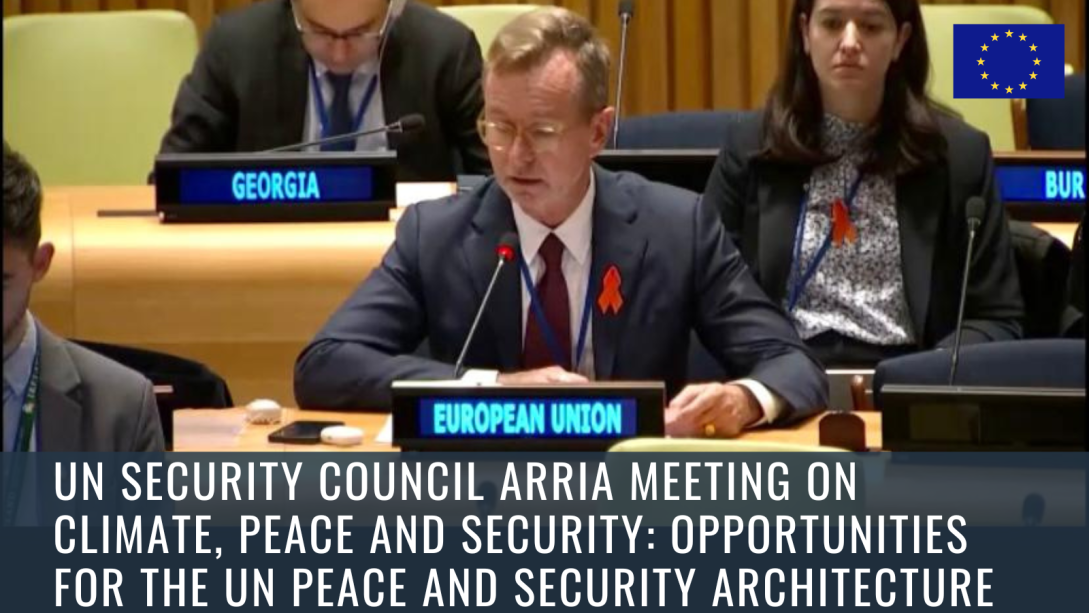EU Statement – UN Security Council Arria meeting on Climate, Peace and Security: Opportunities for the UN Peace and Security Architecture

– CHECK AGAINST DELIVERY –
President,
I have the honour to deliver this statement on behalf of the European Union and its Member States.
The Candidate Countries Türkiye, North Macedonia*, Montenegro*, Serbia*, Albania*, Ukraine and the Republic of Moldova, the potential candidate countries Bosnia and Herzegovina*, Georgia and Andorra, align themselves with this statement.
We thank the hosts of today’s meeting for the initiative as well as the briefers for sharing their insights.
The EU would like to make the following three points on today’s topic: (1) the need to improve our understanding of how the climate crisis is contributing to insecurity; (2) the need to strengthen the UN’s capacity to address the interlinkages between climate and security; and (3) how the EU is contributing in this regard.
President,
Firstly, on improving our knowledge base: evidence is mounting that climate change is impacting not just our environment, but also our social, political and economic institutions. While the relationship between climate change and security is complex and not fully understood, we need to listen to those voices, many present here today, that are sounding the alarm. Local stakeholders and experts are telling us that in the Lake Chad region fluctuating water levels are causing water scarcity and fueling intercommunal grievances. That in Central Asia, climate change is influencing water flows and challenging regional cooperation on water. And that in Iraq and Afghanistan, rising temperatures and extreme weather are increasing pressure on natural resources and undermining livelihoods.
A regular report by the Secretary-General would improve our information basis and the EU therefore supports the initiative. Such a dedicated report should include a gender-sensitive assessment of early warning indicators and foresights of climate-related security risks, as well as concrete recommendations for action by UN organs to address these risks.
Second, we need to strengthen the UN system’s response more broadly. The Security Council has recognized climate and security risks and mainstreamed action across country and regional peacekeeping mandates. UN missions should have dedicated capacity, both in terms of personnel and training, to deliver on these mandates. The Council needs to go a step further and adopt a thematic resolution on climate and security. The Informal Expert Group on Climate and Security is improving understanding and exchange among Council members, and the EU commends the work of Kenya and Norway this year as co-chairs. We also welcome the work of the Climate Security Mechanism, which has been instrumental to building UN system wide capacity. Appointing a Special Envoy for climate and security would allow for a more systematic UN-wide approach. We further call on the UN to reinforce its partnerships with regional actors such as the African Union. Yesterday’s consultations between the AU Peace and Security Council and the UN Peacebuilding Commission are a welcome step in this regard. Mitigation remains our collective goal and we therefore also call for stronger efforts to reduce the footprint of UN missions and operations.
And finally, third, the EU is playing its part: the EU’s Integrated Approach on Climate Change and Security provides the framework for our external action. We are systematically considering climate and environmental risks in our foreign and security policy. As part of our EU-UN partnership we are working with the UN to improve conflict prevention measures, such as early warning systems and strategic foresight, and supporting international instruments, such as the Sendai Framework for Disaster Risk Reduction. For example, through our Climate Change and Security Partnership with UNEP we have developed tools and capacities to enhance climate –security analysis and preventive action in Nepal and Sudan. As a member of the Group of Friends on Climate and Security, led by Nauru and Germany, we are keeping this issue high on the UN’s agenda. As the world’s biggest contributor of climate finance, we are supporting adaptation and mitigation, especially in the most vulnerable countries. And closer to home, the European Green Deal will ensure our own climate resilience in a shifting geopolitical security landscape.
Next year we will present an even more ambitious framework for the EU’s work on climate, peace and security, allowing us to be an even stronger partner at the UN to address this issue.
President,
You do not need to take our word for it. Let us to listen to the voices of those most affected, whether in Least Developed Countries, Small Island States, Landlocked Developing States, from Central America to the Pacific and from Africa to Asia.
It is beyond time for the UN’s peace and security architecture to adapt and become fit for purpose. The EU is committed to playing its part.
I thank you.
* North Macedonia, Montenegro, Serbia, Albania and Bosnia and Herzegovina continue to be part of the Stabilisation and Association Process.
